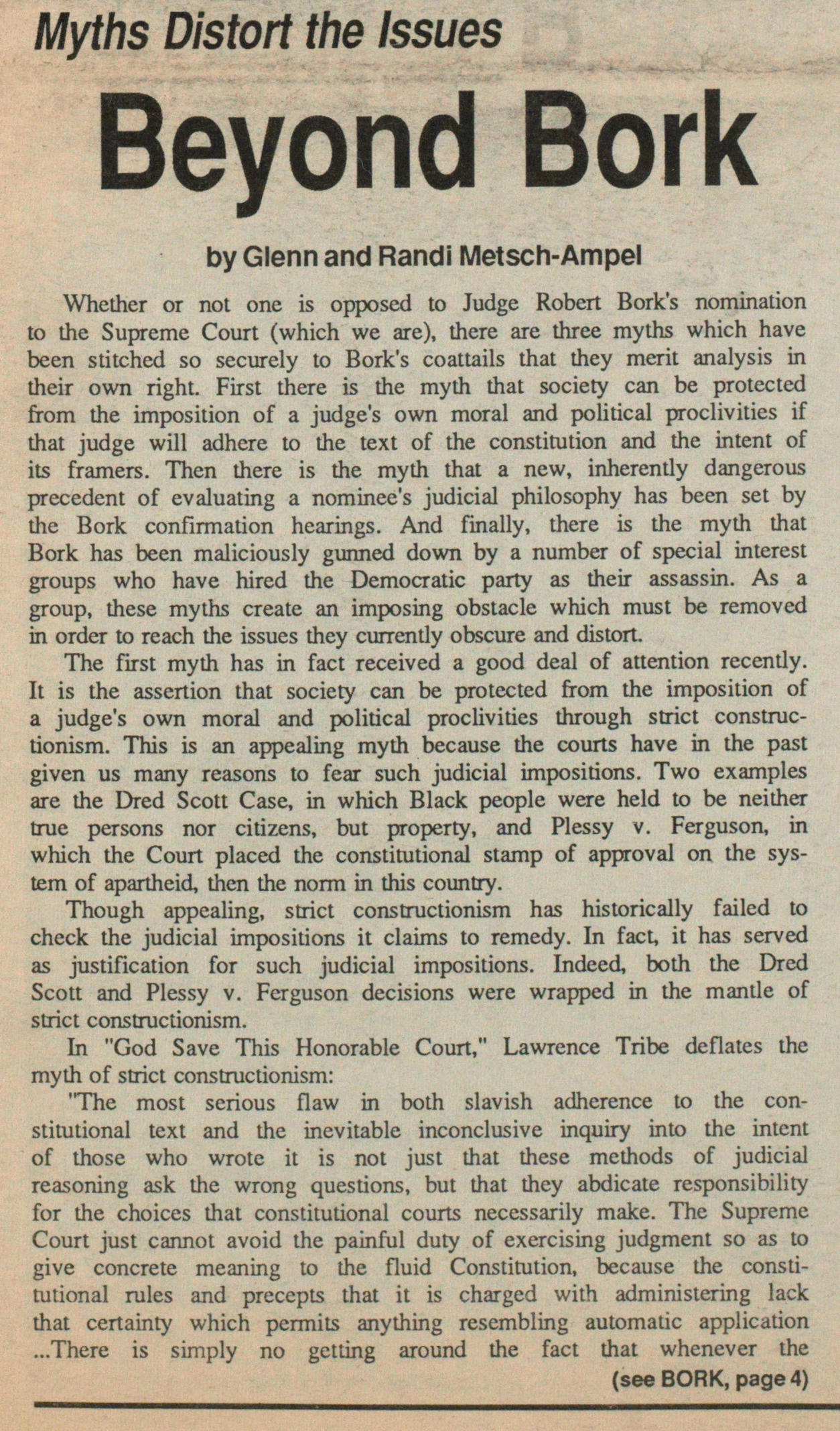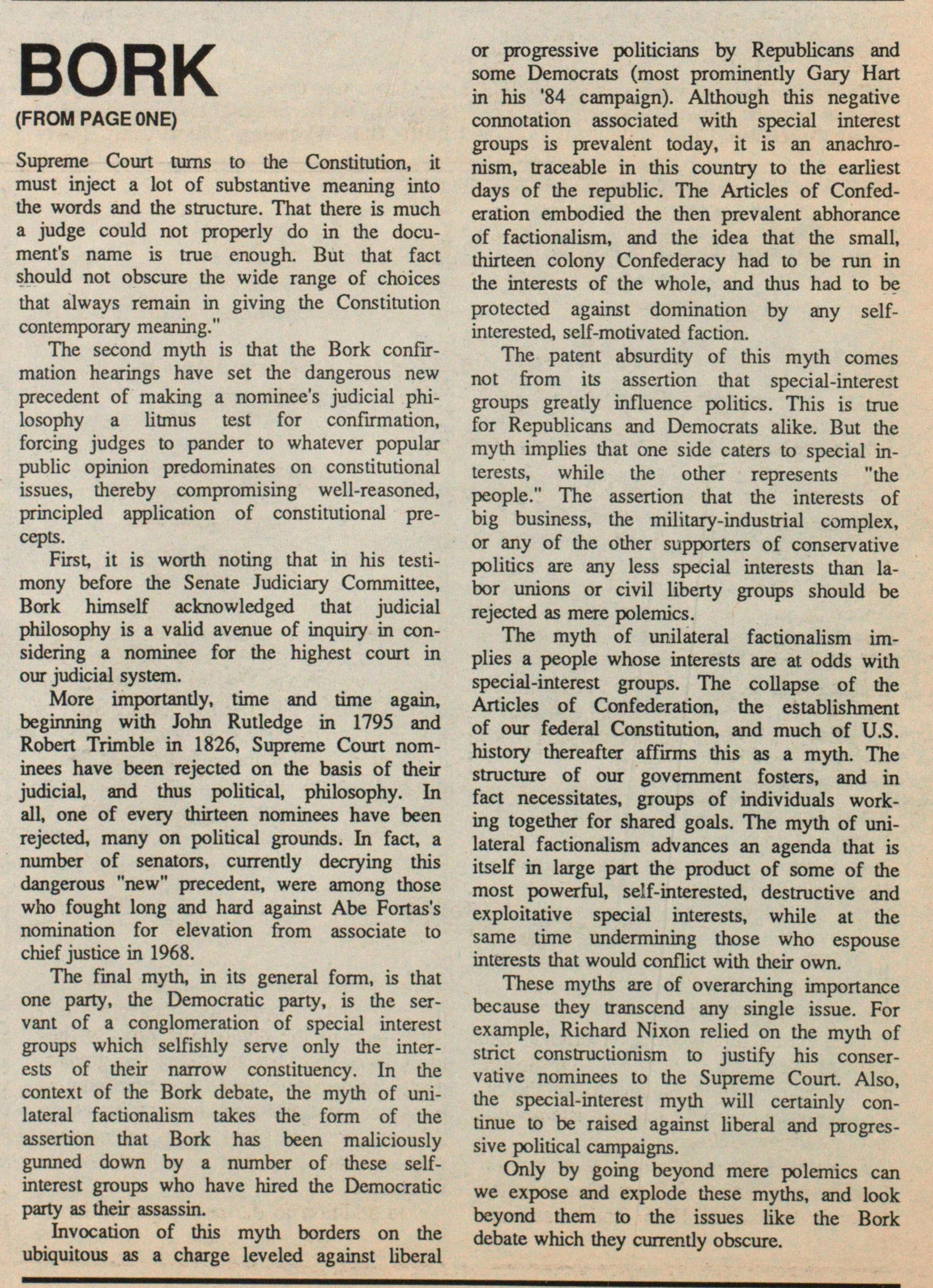Beyond Bork


Myths Distort the Issues
Beyond Bork
by Glenn and Randi Metsch-Ampel
Whether or not one is opposed to Judge Robert Bork's nomination to the Supreme Court (which we are), there are three myths which have been stitched so securely to Bork's coattails that they merit analysis in their own right. First there is the myth that society can be protected from the imposition of a judge's own moral and political proclivities if that judge will adhere to the text of constitution and the intent of its framers. Then there is the myth of that a new, inherently dangerous precedent of evaluating a nominee's judicial philosophy has been set by the Bork confirmation hearings. And finally, there is the myth that Bork has been maliciously gunned down by a number of special interest group, these myths create an imposing obstacle which must be removed in order to reach the issues they currently obscure and distort.
The first myth has in fact received a good deal of attention recently. It is the assertion that society can be protected from the imposition of a judge's own moral and political proclivities through strict constructionism. This is an appealing myth because the courts have in the past given us many reasons to fear such judicial impositions. Two examples are the Dred Scott Case, in which Black people were held to be neither true persons nor citizens, but property, and Plessy v. Ferguson, in which the Court placed the constitutional stamp of approval on the system of apartheid, than the norm in this country.
Though appealing, strict constructionism has historically failed to check the judicial impositions it claims to remedy. In fact, it has served as justification for such judicial impositions. Indeed, both the Dred Scott and Plessy v. Ferguson decisions were wrapped in the mantle of strict constructionism.
In "God Save This Honorable Court," Lawrence Tribe deflates the myth of strict constructionism:
"The most serious flaw in both slavish adherence to the constitutional text and the inevitable inconclusive inquiry into the intent of those who wrote it is not juts that these methods of judicial reasoning ask the wrong questions, but that they abdicate responsibility for the choices that constitutional courts necessarily make. The Supreme Court just cannot avoid the painful duty of exercising judgement so as to give concrete meaning to the fluid Constitution, because the constitutional rules and precepts that it is charged with administering lack that certainty which permits anything resembling automatic application...There is simply no getting around the fact that whenever the Supreme Court turns to the Constitution, it must inject a lot of substantive meaning into the words and the structure. That these is much a judge could not properly do in the document's name is true enough. But that fact should not obscure the wide range of choices that always remain in giving the Constitution contemporary meaning."
The second myth is that the Bork confirmation hearings have set the dangerous new precedent of making a nominee's judicial philosophy a litmus test for confirmation, forcing judges to pander to whatever popular public opinion predominates on constitutional issues, thereby compromising well-responded, principles application of constitutional precepts.
First, it is worth noting that in his testimony before the Senate Judiciary Committee, Bork himself acknowledged that judicial philosophy is a valid avenue of inquiry in considering a nominee for the highest court in our judicial system.
More importantly, time and time again, beginning with John Rutledge in 1795 and Robert Trimble in 1826, Supreme Court nominees have been rejected on the basis of their judicial, and thus political, philosophy. In all, one of every thirteen nominees have been rejected, many on political grounds. In fact, a number of senators, currently decrying this dangerous "new" precedent, were among those who fought long and hard against Abe Fortas's nomination for elevation from associate to Chief Justice 1968.
The final myth, in its general form, is that one party, the Democratic Party, is the servant of a conglomeration of special interest groups which selfishly serve only the interests of their narrow constituency. In the context of the Bork debate, the myth of unilateral factionalism takes the form of the assertion that Bork has been maliciously gunned down by a number of these self-interest groups who have hired the Democratic Party as their assassin.
Invocation of this myth borders on the ubiquitous as a charge leveled against liberal or progressive politicians by Republicans and some Democrats (most prominently Gary Hart in his '84 campaign). Although this negative connotation associated with special interest groups is prevalent today, it is an anachronism, traceable in this country to the earliest days of the republic. The Articles of Confederation embodied the then prevalent abhorrence of factionalism, and the idea that the small, thirteen colony Confederacy had to be run in the interests of the whole, and thus had to be protected agains domination by any self-interested, self-motivated faction.
The patent absurdity of this myth comes not from its assertion that special-interest groups greatly influence politics. This is true for Republicans and Democrats alike. But the myth implies that one side caters to special interest, while the other represents "the people". The assertion that the interests of big business, the military-industrial complex, or any of the other supporters of conservative politics are any less special interests than labor unions or civil liberty groups should be rejected as mere polemics.
The myth of unilateral factionalism implies a people whose interests are at odds with special-interest groups. The collapse of the Articles of Confederation, the establishment of our federal Constitution, and much of U.S. history thereafter affirms this as a myth. The structure of our government fosters, and in fact necessitates, groups of individuals working together for shared goals. The myth of unilateral factionalism advances an agenda that is itself in large part the product of same of the most powerful, self-interested, destructive and exploitative special interests, while at the same time undermining those who espouse interests that would conflict with their own.
These myths are of overarching importance because they transcend any single issue. For example, Richard Nixon retired on the myth of strict constructionism to justify his conservative nominees to the Supreme Court. Also, the special-interest myth will certainly continue to be raised against liberal and progressive political campaigns.
Only by going beyond mere polemics can we expose and explode these myths, and look beyond them to the issues like the Bork debate which they currently obscure.